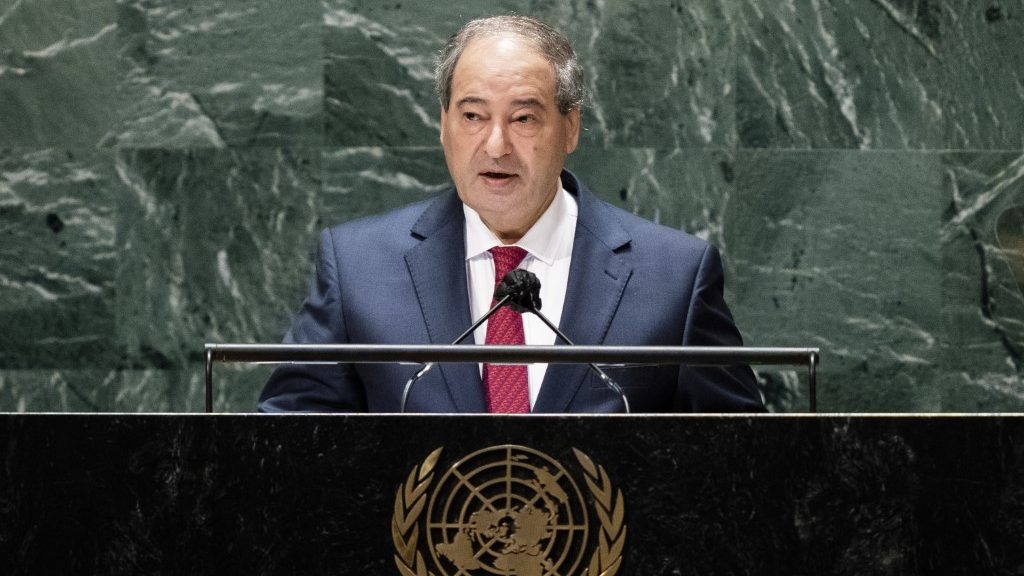Last Sunday, Faisal al-Mekdad, Vice-President in the ousted regime of Bashar al-Assad, released his first statement following the regime’s fall on December 8. In the statement, initially published by the local newspaper Al-Watan (pro-Assad) before being deleted, Mekdad noted that Syria had experienced significant events in the past two weeks that captured regional and global attention. Many had expected these changes to lead to widespread bloodshed and destruction, but, according to Mekdad, the Syrian people, particularly the youth who led the movement, recognized that violence does not build nations or foster hope for a promising future.
Mekdad emphasized the necessity of preserving Syria’s territorial integrity, independence, and sovereignty, asserting that Syria could only build its present and future by maintaining its cultural and human role in the region and the world. He also expressed hope that efforts by Syrian youth, including the proposed National Dialogue Conference, would meet the aspirations of the Syrian people and highlight the civilized image of their country through a consensus-driven political roadmap.
A Late Statement, Lacking Accountability
Mekdad’s delayed statement made no mention of the ousted Assad regime. It failed to include any apology or explicit acknowledgment—direct or indirect—that the changes in Syria resulted from a revolution lasting over 13 years. Former Syrian diplomat Bassam Barabandi described Mekdad’s statement as belated—not only after the regime’s fall but also by 13 years, during which Mekdad chose to defend the regime.
Regarding Mekdad’s comments on the proposed National Dialogue Conference, Barabandi told Enab Baladi that Mekdad has no viable political future in Syria. The public would not elect him in any capacity, and he would likely be among the primary defendants in future legal proceedings addressing the Assad regime’s war crimes, including chemical weapon attacks, human rights violations, and incitement to violence. Barabandi suggested that Mekdad’s statement might be an attempt to rehabilitate his image. However, Mekdad neither apologized nor admitted personal or governmental wrongdoing.
Mekdad’s Role in the Regime and Historical Context
Faisal Mekdad served as the fourth Foreign Minister under the Assad family’s rule. Bashar al-Assad appointed him Foreign Minister in November 2020, before naming him Vice President this past September.
Mekdad used the topic of the proposed National Dialogue Conference as a pretext to release his belated statement. This coincided with discussions about a visit by the head of the “Military Operations Administration,” Ahmad al-Sharaa (Abu Mohammad al-Jolani), to former Vice President Farouk al-Sharaa. Farouk had been sidelined by Bashar al-Assad at the start of the Syrian revolution but was reportedly invited to attend the National Dialogue Conference.
Barabandi noted that Farouk al-Sharaa’s participation in the proposed conference is reasonable, unlike Mekdad’s. Farouk al-Sharaa had, within his limited capacity, attempted to advise the regime against its actions, recognizing all the deceased as “martyrs” and advocating for a fresh start. This, Barabandi argued, makes it impossible to equate al-Sharaa with Mekdad.
Barabandi further explained that Bashar al-Assad’s media advisor, Bouthaina Shaaban, and Faisal Mekdad had actively worked against Farouk al-Sharaa’s initiatives. They were involved in orchestrating the liquidation of individuals associated with al-Sharaa’s projects, which were instigated by Mekdad and Shaaban themselves.
The Observer’s Comments
The ambassador of the Assad regime to Moscow, Bashar al-Jaafari, also published a video on Monday, breaking his silence. After defending the regime for years, labelling the opposition as “terrorists” and denying the use of chemical weapons against rebel-held cities, he criticized the corruption and tyranny of the former president. His video was heavily criticized on social media.
This article was translated and edited by The Syrian Observer. The Syrian Observer has not verified the content of this story. Responsibility for the information and views set out in this article lies entirely with the author.


